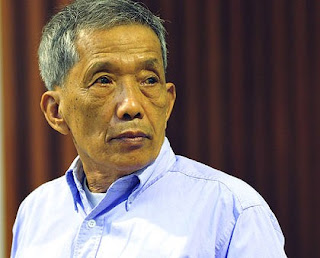 The Khmer Rouge's top prison chief was yesterday sentenced to 30 years in jail by a United Nations-backed war crimes court for his role in Cambodia's mass killings and other atrocities in the late 1970s.
The Khmer Rouge's top prison chief was yesterday sentenced to 30 years in jail by a United Nations-backed war crimes court for his role in Cambodia's mass killings and other atrocities in the late 1970s.Kaing Guek Eav - better known as Duch - is the first member of the regime to be convicted in an international tribunal over the deaths of up to 2 million people through starvation, overwork and execution.
The 67-year-old was initially given 35 years but the court reduced the sentence after ruling that he had been detained illegally for years before the UN-backed tribunal was established.
Duch apologised during his trial for overseeing the murders of about 15,000 men, women and children at Tuol Sleng prison, also known as S-21, but shocked the court in November by finally asking to be acquitted.
The maths teacher-turned-revolutionary was convicted of charges including crimes against humanity and war crimes.
''The role of the accused as the undisputed head of S-21 is confirmed by the accused's own admission, the testimony of witnesses and civil parties,'' the head judge, Nil Nonn, said as he read out the verdict yesterday.
''Every individual detained within S-21 was destined for execution in accordance with the Communist Party of Kampuchea policy to smash all enemies.''
Tuol Sleng was the centre of the Khmer Rouge security apparatus and thousands of inmates were taken from there for execution in a nearby orchard that served as a ''Killing Field''.
Crowds of Cambodians, including regime survivors and Buddhist monks, turned up at the specially built court on the outskirts of Phnom Penh, hoping to finally see justice for the Khmer Rouge's crimes during its rule from 1975 to 1979.
Prosecutors had asked for a 40-year prison sentence from the tribunal, which did not have the power to impose the death penalty. Duch, wearing a blue shirt, slumped in his chair as the tribunal read out the verdict in a courtroom shielded by a huge bullet-proof screen.
Led by ''Brother Number One'', Pol Pot, the Khmer Rouge were responsible for some of the worst atrocities of the 20th century, wiping out nearly a quarter of the Cambodian population.
Rising to power as a tragic spin-off of the US war in Vietnam, the movement emptied Cambodia's cities to take society back to a rural ''Year Zero'', purging city dwellers, intellectuals and even people who wore glasses.
Fifty-five witnesses testified at the trial, including 22 victims who talked about how prison officials tortured them with electric shocks, suffocation and beatings.
''I could never forget the suffering that I received until the day that I die,'' Chum Mey, who had his toenails ripped out at the prison, told the court. ''Once justice can be done, then I would feel better.''
The Khmer Rouge were ousted by Vietnamese-backed forces in 1979 but continued to fight a civil war until 1998. Pol Pot died in the same year.
Duch has been detained since 1999, when he was found working as a Christian aid worker in the jungle, and was formally arrested by the tribunal in July 2007.
The joint trial of four more senior Khmer Rouge leaders charged with genocide is expected to start next year.
If you like this informative post, then please subscribe to my full RSS Feed.